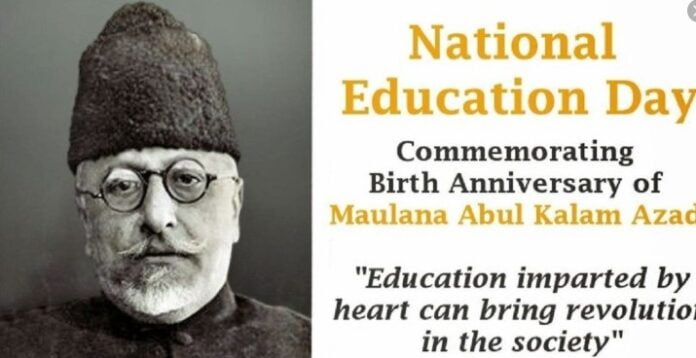National Education Day 2021: History and Key Facts
National Education Day 2021: It is seen on 11 November in India to respect Maulana Abul Kalam’s birthday. Allow us to view National Education Day, its set of experiences and the commitments of Maulana Abul Kalam Azad in the training area.
National Education Day 2021: The National Education Day program was initiated online by the Union Education Minister Dr. Ramesh Pokhriyal ‘Nishank’ at the Indian Institute of Technology Bombay. The program was coordinated by the IIT Bombay to recognize the birth commemoration of India’s First Education Minister Abul Kalam Azad which is likewise celebrated as the National Education Day or Rashtriya Shiksha Diwas consistently on 11 November.
Dr. K. Kasturirangan, Former Chairman, ISRO, and Chairman of the council for drafting the New Education Policy was the Guest of Honor for the event.
Maulana Abul Kalam Azad’s commitments in the field of instruction, country building, and organization building are models. He is the critical draftsman of training in India. He was India’s first Vice President and furthermore the principal schooling priest of autonomous India from 1947 to 1958.
National Education Day: History
On 11 September 2008, the Ministry of Human Resource Development (HRD) declared to remember the birthday of the extraordinary individual by reviewing the commitment of Maulana Abul Kalam Azad in the field of schooling by commending 11 November as National Education Day. Starting around 2008, consistently in India, National Education Day is commended without proclaiming it an occasion.
As indicated by Maulana Abul Kalam Azad, schools are the labs that produce future residents of the country. He is the individual behind IITs and different foundations in India. Presently let us find exhaustively about Maulana Abul Kalam Azad, his initial life, family, and works.
About Maulana Abul Kalam Azad
His unique name was Abul Kalam Ghulam Muhiyuddin and furthermore known as Maulana Abul Kalam Azad or Maulana Azad. He was brought into the world on 11 November 1888 in Mecca now in Saudi Arabia and kicked the bucket on 22 February 1958 in New Delhi.
-
Brought into the world on 11 November 1888
-
Spot of Birth: Mecca, presently Saudi Arabia
-
Father’s Name: Muhammad Khairuddin
-
Mother’s Name: Alia Muhammad Khaieuddin
-
Life partner: Zuleikha Begum
-
Schooling: Homeschool, Self-educated
-
Ideological group: Indian National Congress
-
Distributions: Ghubar-e-Khatir, India Wins Freedom
-
Grants: Bharat Ratna
-
Kicked the bucket: 22 February 1958
-
Reason for Death: Stroke
-
Commemoration: Abul Kalam Azad burial chamber, New Delhi, India
He was a political dissident, columnist, and reformer and focused on building a country through training. He was ahead of the Indian National Congress and was chosen as President of Congress in 1923 and 1940. He was granted Bharat Ratna after death, India’s most noteworthy regular citizen honor in 1992.
In 1912, he began the distribution week by week specifically “Al-Hilal” to assault the arrangements of the British Government and furthermore center around the issues looked at by Indians around then.
In the wake of acquiring freedom, he was designated as India’s first Minister of Education and he was likewise enlisted in the Constituent Assembly to draft India’s Constitution. In his residency, different measures were taken to improve and advance essential and auxiliary instruction. He likewise centered around logical training, set up a few colleges, and advance the roads of exploration and higher investigations. He worked with the expectation of complimentary training in India and composed a few sonnets in Urdu.
Maulana Abul Kalam Azad: Family and Early life, Education
His dad was a Bengali Muslim of Afghan beginning and a researcher. His mom was the girl of a rich Arabian Sheik. At the point when he was youthful, his family moved back to India in Calcutta and there he got customary training at home from his dad and other Islamic researchers. He was impacted by the Indian instructor Sir Sayyid Ahmad Khan and he learned English without his dad’s information. He learned Arabic, Persian, Urdu, reasoning, arithmetic, calculation, and polynomial math. At the point when he was 11 years of age his mom died. At 13 years old, he was hitched to youthful Zuleikha Begum.
Some Educational Institutions set up by Maulana Abul Kalam Azad
- On 28 December 1953, he set up the University Grants Commission (UGC).
- He had set up IISc and School of Architecture and Planning.
- In 1953, he set up Sangeet Natak Academy.
- In 1954, he established Sahitya Akademy and Lalit Kala Akademy.
- In 1951, he set up the Indian Institute of Technology.
- He additionally assumed a critical part in the improvement of the Indian Institute of Science, Bangalore, and the Faculty of the Delhi University.





